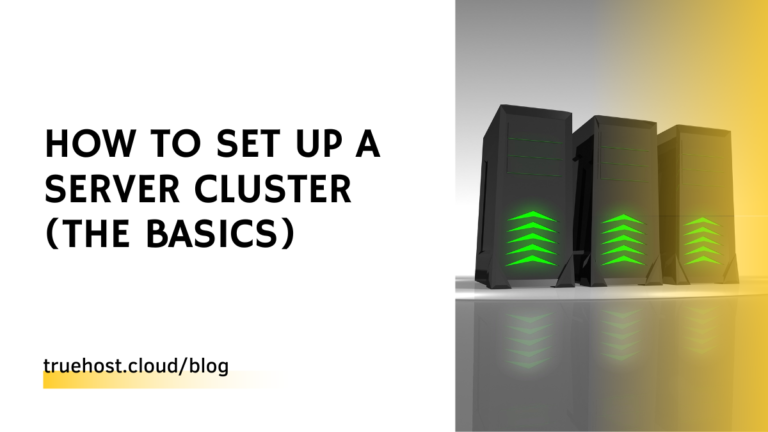Truehost Cloud server clustering allows you to scale your app, system, or business faster and ensure maximum uptime with high availability.
Use Cases
We support different use cases from e-commerce businesses, big social media apps, corporate ERPs, e-government systems e.t.c.
Server clustering is a custom solution that can scale from 2 servers to over 200 servers in a cluster. Optionally clusters can be managed, which allows our cloud engineers to monitor and support your mission-critical apps in real time.
Server Cluster Pricing
Get started with Server Clustering from $600/month
Server Cluster FAQs
What is a cluster?
A computer cluster is a group of two or more computers, or nodes, that work together to achieve a common goal. This allows workloads consisting of a high number of individual, parallelizable tasks to be distributed among the nodes in the cluster.
In simple terms, a cluster is a grouping of two or more computer servers or nodes that run in parallel to achieve a common objective such as failover option, distributed loading, real-time backup e.t.c
How does a Cluster work?
Depending on the objective, a cluster distributes individual tasks from the workload into parallel nodes in the cluster thereby, achieving distributed loading on the cluster.
What is the benefit of clustering?
The main benefit of clustering is providing a failover option. There are two ways a cluster provides s failover support:
Load redistribution: Load redistribution refers directing of load from a node that may have failed.
Request recovery: Refers to the system’s attempt to recover when the system fails, the system attempts to reconnect Web users with queued or processing requests to another node.
What is the difference between a cluster and a standalone server?
A cluster is a group of servers that work together to provide high availability and scalability. A standalone server is a single server that is not part of a cluster.
The main difference between a cluster and a standalone server is that a cluster can provide high availability and scalability, while a standalone server cannot. A cluster is composed of multiple servers that work together to provide a service, while a standalone server is just one server. Clusters are often used to provide web services or other services that need to be highly available so that if one server in the cluster goes down, the others can pick up the slack. Standalone servers are typically used for small applications or for testing purposes.
What is the difference between a node and a server?
A node is a point in a network, while a server is a computer that provides services to other computers in the network.
What is a cluster node server?
A cluster node server is a type of server that is used to store and manage data in a clustered environment. Cluster nodes are usually connected to each other via a high-speed network and work together to provide high availability and scalability.
Is the cloud a cluster of servers?
The cloud is a cluster of servers, but it’s not just a bunch of servers. The cloud is a network of computers that work together to provide a service, like Google Drive or Dropbox. The advantage of the cloud is that it’s scalable and can be used by anyone, anywhere.
How many nodes are in a cluster?
A cluster is typically composed of a group of servers, each of which is called a node. The number of nodes in a cluster can vary but is usually between 2 and 10.
What is the difference between cluster and instance?
A cluster is a group of instances that work together to provide high availability and scalability. An instance is a single server in a cluster.
What is a 3-node cluster?
A 3 node cluster is a group of three servers that are interconnected and work together to provide high availability and scalability. The servers in a 3 node cluster can be configured to provide failover capabilities so that if one server goes down, the other two can take over its workload.
What is a 2 node cluster?
A 2 node cluster is a type of failover cluster that consists of two nodes, or servers. The two nodes are connected to each other via a private network, and share storage. In the event of a failure, the other node takes over.
Related articles:

WordPress Server Clusters: Best Providers
Are you tired of your WordPress website experiencing downtime and sluggish performance? Say goodbye to those frustrating moments by considering the power of WordPress server clusters. In this article, we’ll explore the concept of WordPress server clusters and how they can revolutionize your website hosting experience. What is a WordPress Server Cluster? A WordPress server …
Continue reading “WordPress Server Clusters: Best Providers”

Exploring New Ways to Optimize Servers for Performance
As organizations continue to face pressure to do more with less, they are looking for new ways to optimize their servers for performance. In this article, we will explore some of the latest techniques for optimizing servers for performance. By using these techniques, organizations can improve their server utilization and get the most out of …
Continue reading “Exploring New Ways to Optimize Servers for Performance”

Types Of Servers and Their Pros and Cons
When it comes to servers, there are a lot of options out there. And with so many options, it can be tough to decide which one is right for you. But don’t worry, we’re here to help. In this article, we’ll break down the different types of servers and their pros and cons. By the …

How Server Clusters can Benefit Your Organization’s Performance
In this article, we’ll explore how server clusters can benefit your organization’s performance by providing high availability and scalability. We’ll also look at some of the challenges associated with implementing a cluster, such as managing failover and ensuring data consistency. First, let’s look at some of the perks you stand to enjoy. Increased Uptime Most …
Continue reading “How Server Clusters can Benefit Your Organization’s Performance”

How To Set Up A Server Cluster (The Basics)
A server cluster is a group of servers that work together to provide failover and load balancing. In this article, we will show you how to set up a server cluster. Prerequisites for setting up a Server Cluster To set up a server cluster, there are a few things you will need: First, you will …
Continue reading “How To Set Up A Server Cluster (The Basics)”